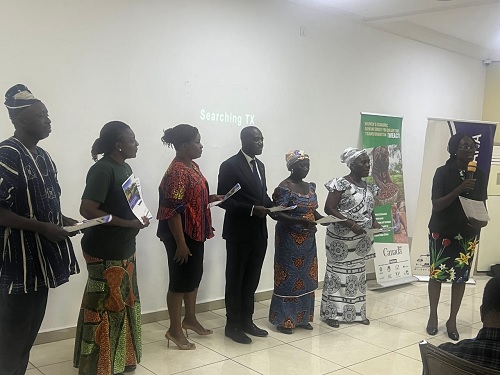
Policy dialogue on women’s economic rights held
A policy dialogue to increase knowledge on the gender and spousal provisions in the Land Act, 2020 has been held in Accra.
It was organised by the Women in Law and Development (WiLDAF) with support from OXFAM under its Women’s Economic Advancement for Collective Transformation (WEACT) and the Together Against Poverty (TAP) projects, with funding from Global Affairs Canada.
The main aim of the dialogue was to engage key stakeholders such as civil society actors, women farmers and state actors on issues concerning women’s land rights, to increase knowledge on the gender and spousal provisions in the Land Act, 2020 and to disseminate and launch two policy briefs.
Policy briefs
The two policy briefs were, ‘Improving Women’s Access to Productive Resources in the Shea and Cocoa Value Chain Commodities’ and ‘Enhancing Women’s Property Rights in Shea and Cocoa-production Communities’.
A Programmes Manager, WiLDAFGhana, Loise Aduamoah-Addo in a welcome address said the dialogue was to strengthen knowledge by civil society actors and women farmers on the gender and spousal provisions and accountability provisions in the Land Act 2020.
She said the dialogue was also to increase knowledge on strengthening gender-responsive budgeting at the district level.
Ms Aduamoah-Addo explained that the WEACT was a five-year project funded by Global Affairs Canada (GAC) and implemented by Oxfam in Ghana, alongside WiLDAF Ghana and other consortium partners in collaboration with the Oxfam Together Against Poverty (TAP) Project.
The TAP project was also a year project funded by Oxfam and implemented in collaboration with partners including WILDAF and the Ghana Trade and Livelihood Coalition (GTLC) with a focus on addressing inequality among women, men and the youth concerning strengthening women’s land rights and gender-responsive budget.
She added that the two projects sought to tackle systematic barriers and inequalities women in the country faced in their efforts to be economically and socially empowered.
The project, she said, focused on women whose economic activities revolved around the food production, cocoa and shea value chain in the Western, Western North, Northern, Savannah Upper East and Upper West regions.
A legal practitioner, Catherine Ama Nartey, who made a presentation on the Gender, Spousal Provisions and Accountability in the Land Act, 2020, called on women to be assertive to be able to take their rightful place in their marriages and society as a whole.
She said women could own land with their names on it or jointly with their husbands and, therefore, should not allow themselves to be cheated of their rights.
A Representative from OXFAM in Ghana, Fati Alhassan in a statement said it was helping to implement the WEACT project, which was aimed at increasing the ability of women and young girls through the shea and cocoa value chain.
The Executive Director, GTLC, Ibrahim Alkabila, who spoke on “Advancing economic justice for women, youth and men,” called for gender-responsive budgeting at the district assembly level to ensure that different social groups in communities were catered for adequately.
A panel discussion saw panellists calling for more education on women’s economic rights, especially with regard to land rights so that they could be economically viable.
Writer’s email:rebecca.quaicoe-duho@graphic.com.gh
